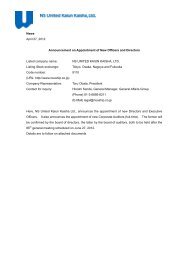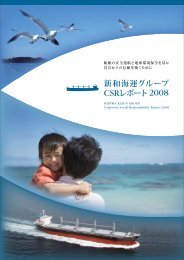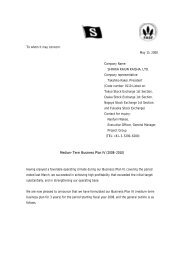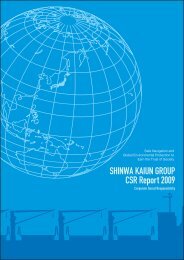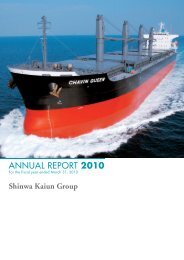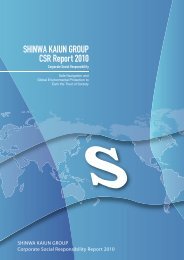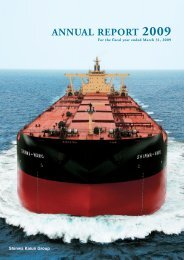Shinwa Kaiun Group CSR Report 2008
Shinwa Kaiun Group CSR Report 2008
Shinwa Kaiun Group CSR Report 2008
- No tags were found...
You also want an ePaper? Increase the reach of your titles
YUMPU automatically turns print PDFs into web optimized ePapers that Google loves.
Conservation of Air Quality<strong>Shinwa</strong> Chemical Tanker Co., Ltd.Shinju Maru No. 1, which transports LNG,a fuel with very little CO2 emissionskt7006005004003002001000Fuel Consumption15.4 13.8 13.613.713.0 13.046312 1212 13 10425 431400411380t/kt161990 2003 2004 2005 2006 2007MDOHFO Fiscal yearFuel consumption per unit load t/ktkt1,800100.0%1,6001,4001,4091,2001,000800600400CO2 Emission Volume89.8% 88.8% 84.6% 84.4% 89.0%1,1931,2571,331 1,281 1,3511412108642010020001990 2003 2004 2005 2006 2007Total CO2Fiscal yearCO2 emissions per load unitcompared to fiscal 199080604020Prevention of Global WarmingGlobal warming is said to be caused by greenhouse gases such as CO2. Vesselsneed to burn fossil fuel such as fuel oil to run, and these emit CO2-containing exhaustfumes. At present, the only effective way to reduce this CO2 gas is to reduce fuelconsumption. We are taking the followingmeasures to reduce fuel consumption:Use of energy-saving equipment and devices.Improving propulsion performance by hullcleaning/ polishing of propeller.Speed reduction and best-route planning inaccordance with changing situations.Minimizing fuel consumption per transported unitwith efficient shipping schedules and increasedcargo loads.Before propellerpolishingBefore hullcleaningAfter propellerpolishingAfter hullcleaningPrevention of Air Pollution Prevention of Acid RainExhaust gases from ships contain nitrogen oxides NOxand sulphur oxides SOx,which cause air pollution, including acid rain.Regarding NOx, diesel engines with a power output of more than 130 kW installedon board ships whose construction started on or after January 1, 2000, must complywith the NOx emission limits specified by the relevant convention. Each of our newvessels is equipped with a new-model engine with low NOx emissions.Also, for SOx emission control, the sulphur content of any fuel oil used on boardships must not exceed 4.5%. We procure fuel oil that meets ISO standards forrestricting SOx emissions.Preventing the Generation of DioxinsTo prevent generation of dioxin, incinerators capable of rapidly cooling the exhaustgas temperature to 200°C are installed in all newly built ships.E n v i r o n m e n t a l R e p o r tkt35,00030,00025,00020,00015,00030,166Traded Cargo Volume28,43430,29633,69532,498 32,32810,0001990 2003 2004 2005 2006 2007Fiscal yearPrevention of Ozone DepletionFreon and halon are regarded as causes of ozone depletion. Freon was used foronboard freezing and cooling machinery, while halon has been used in fireextinguishing systems.For our new ships, we have adopted freezing and cooling machinery that usealternatives to Freon.New installation of halon fire-extinguishing systems has been prohibited since July1992, and most of our ships are now equipped with CO2 fire extinguishing systemsor high-expansion-foam fire extinguishing systems.<strong>Shinwa</strong> <strong>Kaiun</strong> <strong>Group</strong> <strong>CSR</strong> <strong>Report</strong> <strong>2008</strong> 17


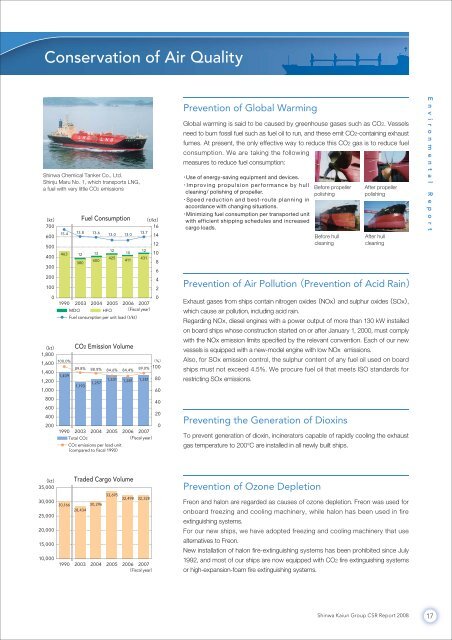
![[Consolidated] Balance Sheet (B/S)(PDF/35KB)](https://img.yumpu.com/49745625/1/184x260/consolidated-balance-sheet-b-spdf-35kb.jpg?quality=85)
